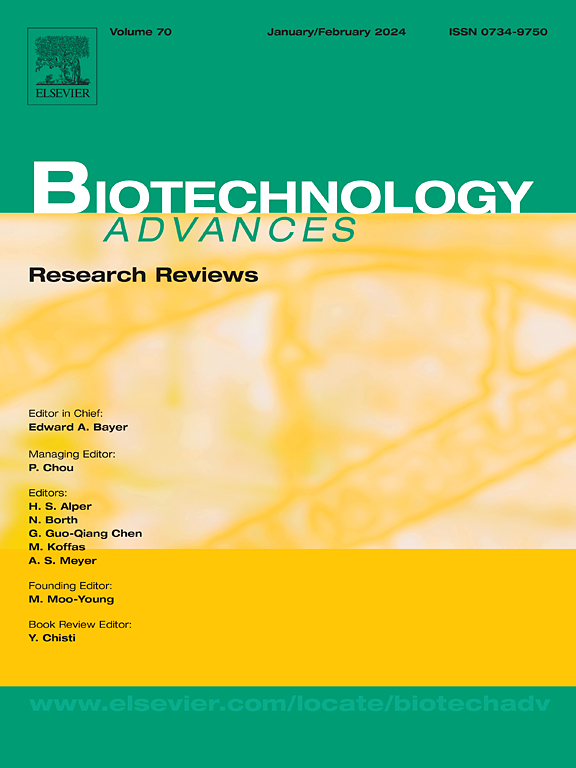Technological advancement spurs Komagataella phaffii as a next-generation platform for sustainable biomanufacturing
IF 12.1
1区 工程技术
Q1 BIOTECHNOLOGY & APPLIED MICROBIOLOGY
引用次数: 0
Abstract
Biomanufacturing stands as a cornerstone of sustainable industrial development, necessitating a shift toward non-food carbon feedstocks to alleviate agricultural resource competition and advance a circular bioeconomy. Methanol, a renewable one‑carbon substrate, has emerged as a pivotal candidate due to its abundance, cost-effectiveness, and high reduction potential, further bolstered by breakthroughs in CO₂ hydrogenation-based synthesis. Capitalizing on this momentum, the methylotrophic yeast Komagataella phaffii has undergone transformative technological upgrades, evolving from a conventional protein expression workhorse into an intelligent bioproduction chassis. This paradigm shift is fundamentally driven by converging innovations across CRISPR-empowered advancement in genome editing and AI-powered metabolic pathway design in K. phaffii. The integration of CRISPR systems with droplet microfluidics high-throughput screening has redefined strain engineering efficiency, achieving much higher editing precision than traditional homologous recombination while compressing the “design-build-test-learn” cycle. Concurrently, machine learning-enhanced genome-scale metabolic models facilitate dynamic flux balancing, enabling simultaneous improvements in product titers, carbon yields, and volumetric productivity. Finally, technological advancement promotes the application of K. phaffii, including directing more efficiently metabolic flux toward nutrient products, and strengthening efficient synthesis of excreted proteins. As DNA synthesis automation and robotic experimentation platforms mature, next-generation breakthroughs in genome modification, cofactor engineering, and AI-guided autonomous evolution will further cement K. phaffii as a next-generation platform for decarbonizing global manufacturing paradigms. This technological trajectory positions methanol-based biomanufacturing as a cornerstone of the low-carbon circular economy.
技术进步促使Komagataella phaffii成为可持续生物制造的下一代平台
生物制造是可持续工业发展的基石,需要向非食品碳原料转变,以缓解农业资源竞争,推进循环生物经济。甲醇是一种可再生的一碳底物,由于其丰富,成本效益和高还原潜力而成为关键的候选者,并进一步加强了CO 2氢化合成的突破。利用这一势头,甲基营养酵母Komagataella phaffii经历了革命性的技术升级,从传统的蛋白质表达主力演变为智能生物生产底盘。这种范式转变从根本上是由crispr驱动的基因组编辑进步和人工智能驱动的K. phaffii代谢途径设计的融合创新驱动的。CRISPR系统与液滴微流体高通量筛选的整合重新定义了应变工程效率,在压缩“设计-构建-测试-学习”周期的同时,实现了比传统同源重组更高的编辑精度。同时,机器学习增强的基因组尺度代谢模型促进了动态通量平衡,从而同时提高了产品滴度、碳产量和体积生产率。最后,技术进步促进了法菲氏菌的应用,包括更有效地将代谢通量导向营养产物,加强排泄蛋白质的有效合成。随着DNA合成自动化和机器人实验平台的成熟,下一代基因组修饰、辅因子工程和人工智能引导的自主进化的突破将进一步巩固K. phaffii作为下一代全球制造业脱碳范例的平台。这一技术轨迹将以甲醇为基础的生物制造定位为低碳循环经济的基石。
本文章由计算机程序翻译,如有差异,请以英文原文为准。
求助全文
约1分钟内获得全文
求助全文
来源期刊

Biotechnology advances
工程技术-生物工程与应用微生物
CiteScore
25.50
自引率
2.50%
发文量
167
审稿时长
37 days
期刊介绍:
Biotechnology Advances is a comprehensive review journal that covers all aspects of the multidisciplinary field of biotechnology. The journal focuses on biotechnology principles and their applications in various industries, agriculture, medicine, environmental concerns, and regulatory issues. It publishes authoritative articles that highlight current developments and future trends in the field of biotechnology. The journal invites submissions of manuscripts that are relevant and appropriate. It targets a wide audience, including scientists, engineers, students, instructors, researchers, practitioners, managers, governments, and other stakeholders in the field. Additionally, special issues are published based on selected presentations from recent relevant conferences in collaboration with the organizations hosting those conferences.
 求助内容:
求助内容: 应助结果提醒方式:
应助结果提醒方式:


